
Transport Policy
Scope & Guideline
Elevating transport discourse to meet global challenges.
Introduction
Aims and Scopes
- Sustainable Transportation Solutions:
Research focused on innovative approaches to enhance sustainability in transportation systems, including the adoption of electric vehicles, public transport enhancements, and policies to reduce carbon emissions. - Transportation Equity and Accessibility:
Studies addressing how transportation policies affect different demographic groups, aiming to improve access and equity in mobility for underserved populations. - Impact of Transportation on Urban Development:
Exploration of the interrelationship between transportation infrastructure and urban growth, including how transport systems can shape land use and economic development. - Behavioral Insights in Transport:
Research examining how individual behaviors and perceptions influence transportation choices, including the role of public attitudes towards various transport modes. - Crisis Response and Resilience in Transport:
Analysis of how transportation systems can adapt and respond to crises such as pandemics or natural disasters, focusing on policy implications and operational strategies. - Transport Policy Evaluation:
Empirical assessments of transportation policies and their effectiveness, utilizing quantitative and qualitative methods to inform future policy development.
Trending and Emerging
- Mobility as a Service (MaaS):
An increasing focus on MaaS as an integrated approach to transportation that combines various transport modes into a single accessible service, promoting convenience and sustainability. - Electric and Autonomous Vehicles:
A surge in research related to the adoption and impact of electric and autonomous vehicles, examining their role in sustainable transport and the necessary infrastructure to support them. - Post-Pandemic Transportation Dynamics:
Emerging studies analyzing changes in transport behavior and policy adaptations in response to the COVID-19 pandemic, focusing on resilience and future-proofing transport systems. - Climate Change Mitigation Strategies:
Growing research on policies and practices aimed at reducing transportation-related greenhouse gas emissions, as well as the integration of climate considerations into transport planning. - Social Equity and Transportation Justice:
A heightened emphasis on understanding and addressing social equity in transportation, ensuring that all demographic groups benefit from transport policies and infrastructure. - Data-Driven Transport Solutions:
An upward trend in utilizing big data and advanced analytics to inform transport policy and operational decisions, enhancing efficiency and user experience.
Declining or Waning
- Traditional Transportation Modes:
Research on conventional transport modes, such as personal vehicles and traditional public transport systems, has seen a decline as more emphasis is placed on sustainable and innovative transportation solutions. - Infrastructure Expansion Without Sustainability:
There is a noticeable decline in papers advocating for large-scale infrastructure expansion without considering sustainability, as the focus shifts towards integrating sustainability into all aspects of transport planning. - Static Models of Transport Demand:
The use of traditional, static models for predicting transport demand is decreasing in favor of dynamic, behavioral models that consider real-time data and individual preferences. - Single-Mode Transportation Studies:
Research focusing exclusively on single modes of transport (e.g., only rail or only road) is becoming less common as there is a growing interest in multimodal and integrated transport systems. - Longitudinal Studies of Transport Behavior:
Long-term studies examining transport behavior trends are less frequent, possibly overshadowed by immediate responses to crises such as the COVID-19 pandemic.
Similar Journals
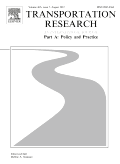
TRANSPORTATION RESEARCH PART A-POLICY AND PRACTICE
Elevating discourse on transportation policy and innovation.TRANSPORTATION RESEARCH PART A-POLICY AND PRACTICE, published by PERGAMON-ELSEVIER SCIENCE LTD, stands as a premier journal in the domain of transportation research. With a robust impact factor and a distinguished reputation, this journal is ranked in the first quartile (Q1) across multiple fields, including Aerospace Engineering, Business, Management and Accounting, Civil and Structural Engineering, Management Science and Operations Research, and Transportation. The journal's comprehensive scope invites contributions that influence policy-making and practice in transportation systems, ensuring relevance in both scholarly and practical contexts. Additionally, the journal's convergence years span from 1992 to 2024, marking a significant history of impactful research. Published in the United Kingdom, it provides a vital platform for researchers, professionals, and students seeking to advance their understanding of transportation issues globally. As an essential resource in the field, this journal facilitates the dissemination of innovative ideas and solutions that shape the future of transportation.
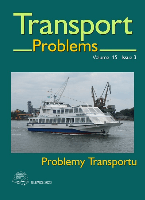
Transport Problems
Navigating the Intersection of Theory and Practice in TransportTransport Problems, published by the Silesian University of Technology, Faculty of Transport, is a distinguished open-access journal that has been advancing scholarship in the fields of Automotive Engineering, Mechanical Engineering, and Transportation since its inception in 2007. With an ISSN of 1896-0596 and an E-ISSN of 2300-861X, this journal serves as a vital platform for researchers and practitioners to disseminate innovative research findings and explore fundamental issues in transport systems and technologies. Based in Poland, the journal covers various topics including transportation logistics, vehicle dynamics, and environmental impacts, thereby addressing critical challenges faced in the transportation sector globally. As reflected in its Scopus rankings, the journal occupies respectable quartiles and continues to contribute valuable insights to the academic community. By making its content freely accessible, Transport Problems significantly enhances the ability of researchers and students alike to engage with the latest developments in transport engineering and contribute to this ever-evolving field.
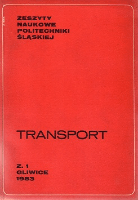
Scientific Journal of Silesian University of Technology-Series Transport
Unlocking insights in aerospace, automotive, and civil engineering.Scientific Journal of Silesian University of Technology-Series Transport is an esteemed academic platform dedicated to the field of transport engineering, published by FAC TRANSPORT SILESIAN UNIV TECHNOLOGY. Established as an Open Access journal since 2008, it ensures wide dissemination and accessibility of research findings to foster knowledge sharing within the global community. With an ISSN of 0209-3324 and an E-ISSN of 2450-1549, this journal plays a critical role in advancing interdisciplinary discussions in applied Aerospace, Automotive, Civil and Structural, and Mechanical Engineering. Currently classified in Q4 across various engineering subfields according to 2023 metrics, it provides a platform for emerging research and insights into transport systems. Despite its recent establishment, the journal demonstrates growing visibility, contributing to a range of social science discussions in transportation with a Scopus percentile ranking of 18th. Researchers, professionals, and students will find valuable knowledge and innovative approaches in its pages, as it bridges theoretical and practical aspects of transport engineering.
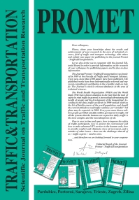
Promet-Traffic & Transportation
Driving Knowledge Exchange in Transportation EngineeringPromet-Traffic & Transportation is a premier open-access journal published by SVEUCILISTE U ZAGREBU, FAKULTET PROMETNIH ZNANOSTI, dedicated to advancing the fields of traffic and transportation engineering. Since its inception in 2001, the journal has played a crucial role in disseminating innovative research and best practices within its scope, which embraces civil and structural engineering, urban studies, and various engineering disciplines. With a Q3 ranking in multiple categories as of 2023, including Civil and Structural Engineering and Ocean Engineering, Promet is positioned to provide valuable insights into contemporary challenges and solutions in transportation systems. Open-access since 2013, the journal ensures that all published articles are freely available to researchers, practitioners, and students globally, fostering a collaborative environment for knowledge exchange. Based in Croatia, it serves as an essential platform for interdisciplinary studies that influence the future of traffic and transportation policies and practices.

Revista de Transporte y Territorio
Bridging Research and Practice in Transportation StudiesRevista de Transporte y Territorio is a prominent academic journal published by the University of Buenos Aires, Institute of Geography, dedicated to the study of transportation systems and territorial dynamics. With its ISSN 1852-7175, this journal serves as a crucial platform for disseminating cutting-edge research and innovative practices in the fields of geography, urban planning, and transportation studies. Aimed at researchers, professionals, and students alike, the journal seeks to foster dialogue and understanding of the interrelationships between transportation and territorial development, providing insights into sustainable solutions for contemporary mobility challenges. Although currently not designated as Open Access, the journal is committed to high academic standards, ensuring that all published works undergo rigorous peer review. Situated in Buenos Aires, Argentina, the Revista de Transporte y Territorio not only highlights regional issues but also contributes to the global discourse on transportation and territory.
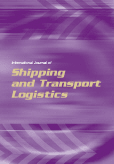
International Journal of Shipping and Transport Logistics
Exploring the Intersection of Technology and LogisticsWelcome to the International Journal of Shipping and Transport Logistics, a premier academic journal published by INDERSCIENCE ENTERPRISES LTD that serves as a vital platform for researchers, practitioners, and students in the fields of logistics, transportation, and management. Established in 2009 and converging through to 2024, this journal is committed to advancing scholarly discussions and innovations related to shipping logistics, supply chain management, and the integration of technology in transportation systems. As evidenced by its Q3 rankings across multiple categories in the 2023 Scopus classification, including Business and International Management, and Management of Technology and Innovation, this journal is recognized for its contributions to the academic community. Though currently not an open access journal, it offers subscriptions that facilitate access to high-quality research and case studies relevant to contemporary challenges in the shipping and transport logistics sectors. Engage with the latest findings and insights that are critical for developing sustainable and efficient transportation strategies globally.

Journal of Transport and Land Use
Exploring the Nexus of Mobility and Urban DevelopmentJournal of Transport and Land Use, published by the University of Minnesota's Center for Transportation Studies, is a prominent open-access journal that has been disseminating high-quality research since its inception in 2008. Focused on the intersections of transportation, urban studies, and land use planning, this journal plays a critical role in addressing contemporary challenges in mobility and spatial development. With an impressive categorization in 2023 as Q2 in Geography, Planning and Development and Transportation, and Q1 in Urban Studies, it stands out with its Scopus rankings that position it within the top quartiles of significant disciplines, reflecting its impact and relevance. Catering to researchers, professionals, and students alike, the Journal of Transport and Land Use seeks to foster interdisciplinary dialogue and collaboration through its comprehensive exploration of the complex relationships between transportation systems and land use policies. With its ongoing commitment to facilitating knowledge dissemination and open access, this journal serves as a vital resource for advancing scholarly discourse in the field.

Urban Science
Advancing Sustainable Solutions for Modern CitiesUrban Science, published by MDPI in Switzerland, is a pioneering open access journal that has been serving the academic community since 2017. With a robust focus on understanding urban environments through various interdisciplinary lenses such as Environmental Science, Geography, Planning and Development, and Urban Studies, this journal aims to advance knowledge on the complexities of urban living and the challenges that modern cities face. Recognized for its impact, Urban Science holds prestigious rankings, including Q1 in Urban Studies and Q2 in multiple relevant categories. Its presence in leading databases like Scopus, where it stands among the top percentile ranks, underscores its contribution to critical dialogues in urban research. The journal’s commitment to accessibility, targeted toward researchers, professionals, and students alike, fosters an inclusive platform for disseminating innovative ideas and solutions necessary for sustainable urban development.
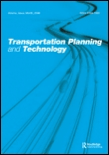
TRANSPORTATION PLANNING AND TECHNOLOGY
Exploring Innovations in Transportation SystemsTransportation Planning and Technology is a prestigious academic journal dedicated to advancing the fields of transportation planning and technology. Published by Taylor & Francis Ltd, this journal serves as a critical platform for disseminating high-quality research and innovative practices in the context of urban and regional transportation systems. With an ISSN of 0308-1060 and an E-ISSN of 1029-0354, the journal has established a significant foothold since its inception in 1972, spanning through to 2024. Recognized in the Q2 category of Geography, Planning and Development and the Q3 category of Transportation in the 2023 rankings, it reflects a solid impact factor supported by its Scopus classifications, holding a rank of #270/821 in Geography, Planning and Development and #72/141 in Transportation. Researchers, professionals, and students alike benefit from the journal's comprehensive scope, which encompasses theoretical aspects, practical applications, and policy implications related to transportation systems. As an essential resource in the field, it invites contributions that enhance our understanding of the complexities in transportation planning, making it a must-read for those engaged in related studies.
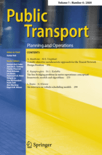
Public Transport
Advancing Knowledge in Transportation and Environmental Management.Public Transport is a prestigious journal published by Springer Heidelberg, focusing on the critical field of transportation systems and their impacts on urban planning, infrastructure, and environmental management. With an ISSN of 1866-749X and an E-ISSN of 1613-7159, the journal has established itself as a vital resource for researchers and practitioners alike, particularly noted for its Q2 ranking in Information Systems, Management Science and Operations Research, and Transportation, alongside a Q1 ranking in Mechanical Engineering as of 2023. This blend of categories underscores its interdisciplinary nature, making it an essential reading for individuals aiming to enhance their understanding of public transport systems from various angles. While the journal currently does not offer open access, its authoritative articles are critical for driving innovation and policy in the transportation sector. With a converged publication period from 2009 to 2024, Public Transport continues to lead discussions, disseminate research trends, and provide insight into the evolution of transportation methodologies, reflecting its significant impact as a reliable academic source in this crucial field.